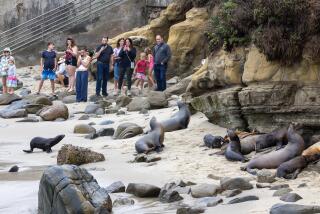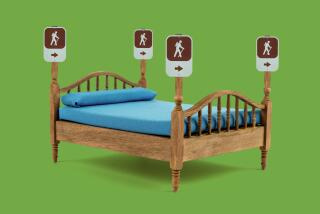The Hazards of Surfing Lunada Bay : Peninsula: Outsiders run the risk of being pelted with rocks or having their vehicles vandalized. The locals offer no apologies for treating the public area as if it was their own.
George, a 42-year-old surfer from Torrance, likens the surfers at Lunada Bay in Palos Verdes Estates to an inner-city youth gang staking out its own turf, terrorizing the innocent and trashing private property.
“It’s typical punk behavior,” he says.
Erick, a surfer from Manhattan Beach, calls the situation with the surfers there a “territoriality-type of thing, like an animal marking its place.”
John, another surfer from Manhattan Beach, says it boils down to a group of selfish rich kids out to make trouble.
“It’s the spoiled Palos Verdes guy with no brains.”
With summer here and surfers hitting the area beaches in droves in search of the perfect wave, one place many say they have no intention of visiting is Lunada Bay, where the local surfers rule and outsiders are disdained.
Of the South Bay beaches frequented by surfers, the area is known as a war zone of sorts, a spot where interlopers venture only if they are willing to risk being pelted with rocks or having their vehicle vandalized.
In fact, surfers such as George, Erick and John say they don’t want their last names printed because they fear retribution from the locals.
“If they are surfers from the South Bay, the word usually spreads through the grapevine that Lunada Bay is not a good place for non-locals,” said Palos Verdes Estates Police Capt. Mike Tracy.
The locals, many of whom grew up in upper- and upper-middle-class neighborhoods near Lunada Bay, offer no apologies for treating the public coastal area as if it was their own private, back-yard pool.
Hard-core violence is certainly not condoned or practiced, the locals say. And they have no intention of hurting anyone who may venture to the area.
“You can’t compare us to a gang,” said Mark Griep, 30, who grew up half a block from the bay and has been surfing there for 20 years.
But verbally threatening outsiders or throwing rocks at them as they scale the steep cliffs at the ocean’s edge, does occur, locals admit. And in the past, outsiders, or trolls as they are called, have returned to their cars after surfing to find their tires flattened, windshields smashed or paint scratched.
“It’s not just a barbaric thing, it is done for a purpose,” said 30-year-old Peter McCollum, who was surfing in the bay recently with several buddies.
“The crowds are so intense these days, you can’t have your own little sanctuary. But we do.”
“It’s just a real strong friendship with one another, we all feed off each other’s high,” said John Givens, 21. “It’s a brotherhood, I must say.”
For decades, surfers have tried to protect their favorite areas from outsiders. Up and down the Southern California coastline, various beaches have reputations as places where visiting surfers can expect to encounter the wrath of the locals.
“Just about every place you surf has localism,” said Ventura County Sheriff’s Department Lt. Paul Anderson. “It’s not a phenomenon that started last month or last week. When I was a kid up here in the mid-’60s you had localism.”
Some surfers say the Palos Verdes Peninsula in general, where popular surf spots include The Indicator, Boneyards and The Cove, has long been perceived as a place where outsiders are frowned upon by locals.
“Palos Verdes is pretty famous for its localism,” said Donna Oakley, managing editor of The Surf Report, a newsletter that forecasts surf conditions worldwide.
Police Capt. Tracy recalls an incident a couple of years ago near The Indicator. While on routine patrol, he spotted a surfer running beside the road, surfboard in hand. He had been dodging rocks thrown at him by the locals.
“He had a panicked look on his face and our eyes met and he flagged me down,” Tracy said. “He said he and a friend were starting to go down a trail and some kids (told them they) should get the hell out.”
But many surfers agree that Lunada Bay is the worst place on the peninsula, and perhaps in all of Los Angeles, for local surfers hassling outsiders.
The reputation is so widespread that a T-shirt sold in local surf shops and emblazoned with a map of South Bay surfing spots has the words “Locals Only” next to Lunada Bay. The Surf Report, in an issue printed several years ago, told readers Lunada Bay wasn’t worth going to until peak surfing conditions ceased and the local crowd thinned out, “unless you know someone who lives there.”
“It’s just not worth it because you don’t necessarily have to have anything done to you physically, but they could do something to your car,” said one surfer who refuses to go to Lunada Bay.
George, the Torrance surfer who stopped going there after he was verbally harassed and had a tire flattened, said: “I figured it was just a bad scene there.”
Tracy said the Lunada Bay surfers rule “by numbers and intimidation, kind of a mini-gang mentality.” Although separate statistics are not kept for Lunada Bay, he estimated the department receives two dozen complaints a year from surfers whose vehicles have been vandalized at Lunada Bay and The Indicator.
Just how many locals regularly ride the waves at Lunada Bay is unknown, but several surfers estimated the number at 100. In past years, they said, feelings that outsiders should not be allowed were even more intense, and often erupted into more violent behavior. One surfer recalled an outsider’s car being pushed over the cliff overlooking the bay.
Nevertheless, the locals say they have no intention of laying down a welcome mat for outsiders. “We have a little attitude going down here, but we have to do it,” said John Rall, an 18-year-old senior at Palos Verdes High School.
“Surfing is a spiritual thing, and when outsiders come up they are not respecting the surfing grounds of the locals,” he said. “Normally, my conscience would say don’t do this, but my heart would say it is the right thing to do because my heart is what is into surfing.”
More to Read
Sign up for Essential California
The most important California stories and recommendations in your inbox every morning.
You may occasionally receive promotional content from the Los Angeles Times.










